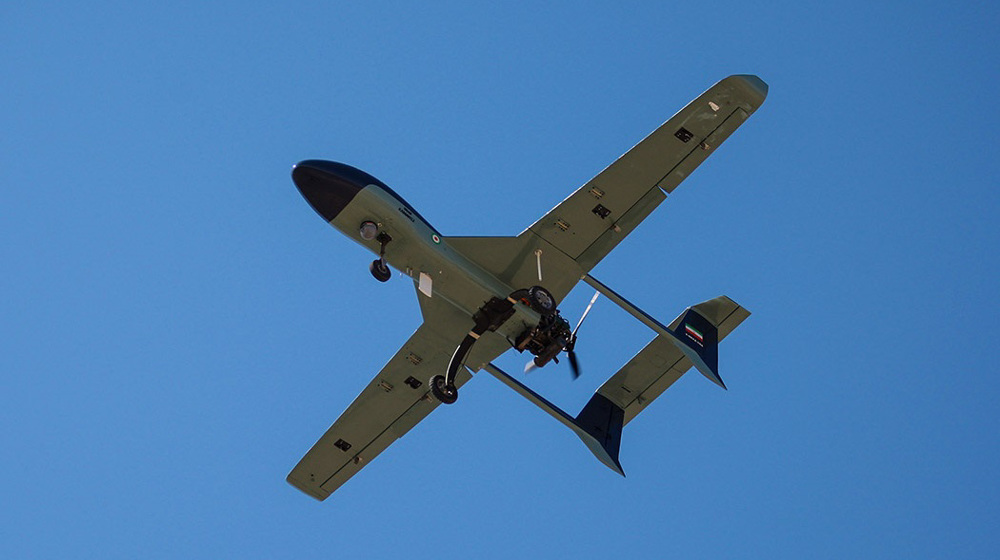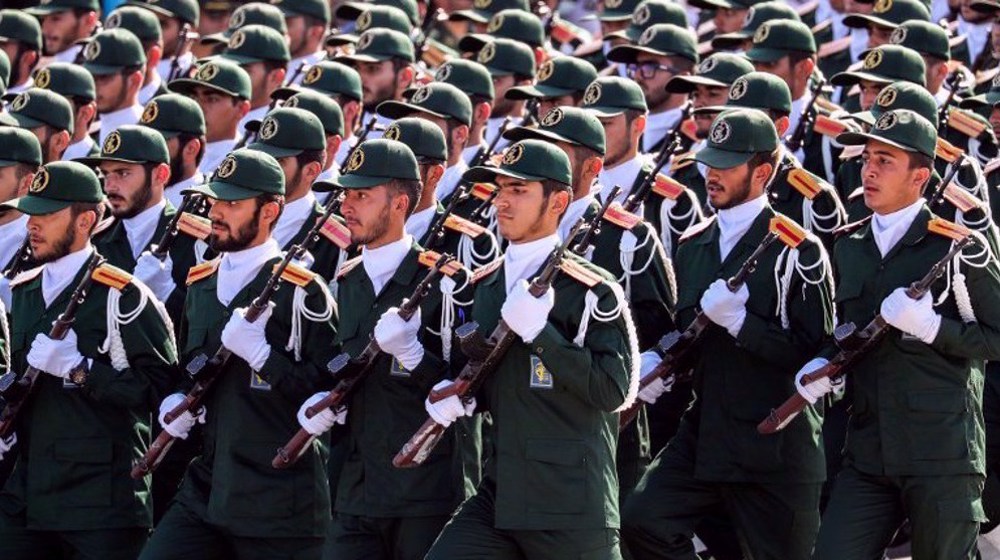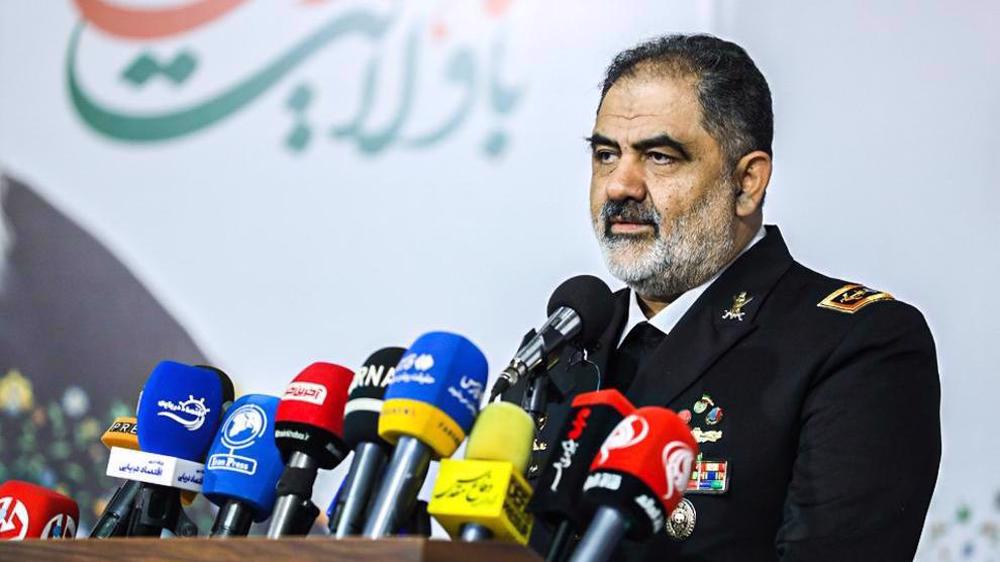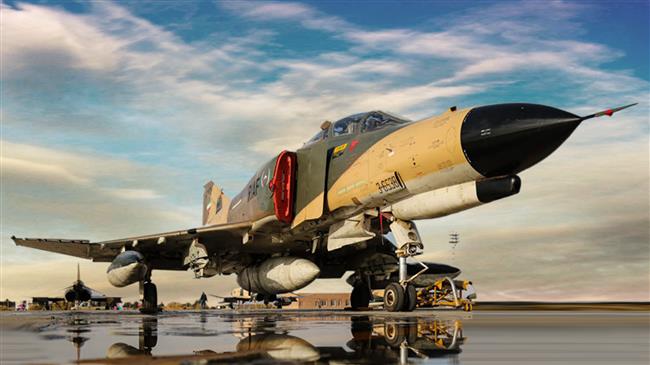Iran destroys mock enemy targets using Kamikaze drones during extensive drills
The Islamic Republic of Iran Air Force (IRIAF) successfully implements the main stage of large-scale maneuvers that have been underway in the country’s central area for days.
Tuesday marked the second and final phase of the main stage in the Fada'eeyan-e Harim-e Velayat (Devotees of the Velayat Sanctuary)-9 exercise that began on Saturday, enlisting as many as seven airbases and dozens of manned and unmanned aircraft.
According to the event’s spokesman Second Brigadier General Farhad Goudarzi, F-4 aircraft took on mock enemy targets, using enhanced an optimized air-to-surface Maverick missiles and Qassed (Messenger) smart, surgical strike, and stand-off bombs.
MIG-29s were also seen successfully deploying improved air-to-air missiles to intercept and destroy missiles fired by mock hostile warplanes.
Both the MIGs and F-4s carried out their respective missions under actual electronic warfare conditions.
Kamikaze drone missions, carpet bombings
Meanwhile, unmanned aerial vehicles dubbed Arash that are outfitted with explosive warheads were smashed into mock enemy fortifications lying across a range of 100 kilometers (62 miles), successfully blowing them up.
Phantom warplanes also carried out surprise carpet bombing operations against designated targets at low altitude.
Goudarzi announced that indigenous Karrar (Striker) bomber drones also conducted their maiden operations featuring deployment of 500-lbs (226 kilogram) bombs against land-based targets.
The official said previously, the ammunition of such weight could only be carried using F-4 and F-5 warplanes, adding that the drones were also recruited in electronic warfare missions to neutralize perceived enemy’s anti-missile operations.
Expert modern warfare teams separately engaged in confronting staged chemical attacks with indigenized decontamination devices.
The main stage began on Monday with a preparatory reconnaissance mission across the assault course and was followed through with domestically-manufactured or -overhauled fighter planes destroying mock hostile targets. The indigenous fighters flown included Kaman (Bow)-14 drones and Saeqeh (Lightning) fighters.
The air force had spent Saturday, the first day of the drills, scrambling the aircraft to the central Iranian province of Isfahan’s Shahid Babayi Airbase, around which the maneuvers have centered.
Speaking at the end of the main stage, Major General Abdolrahim Mousavi, the Iranian Army’s chief commander, hailed that the maneuvers had managed to attain all of their expected goals thanks to the “power, thoroughgoing rigor, and prowess” of the IRIAF’s young pilots and other workforce members.
The enlisted staff, he added, “proved once more that the Air Force is prepared for implementation of all missions as ever.”
He reminded that the aerial drills were the third set of such maneuvers to be carried out by Iranian defense forces this year after two joint exercises recruiting both the Army and the country’s Islamic Revolution Guards Corps (IRGC).
The commander identified the message that has been sent across through this edition of the Fada'eeyan-e Harim-e Velayat exercise as the Iranian Armed Forces, especially the IRIAF’s readiness to confront “whatever threat of whatever dimension or enormity” in order to defend the Islamic Republic’s ideals and the country’s people.
As is the case with all other drills, the maneuvers also bore some direct or potentially tacit messages for the countries’ enemies, he added.
Still addressing the issue of the Islamic Republic’s ill-wishers, General Mousavi called the United States’ “arrogant regime, the biggest threat facing not only our country, but also all nations as well as [universal] freedom and rights.”
Therefore, when the Islamic Republic avows readiness to confront whatever threat, “it is natural that even if the American statesmen chose to commit a mistake or miscalculation, we will confront them with all of our power too.”
Israel indicts two settlers over suspected spying for Hezbollah
Iran: US airstrikes on Yemen war crimes, violation of international law
Yemeni armed forces down F-18 fighter jet, repel US-UK attack: Spokesman
Iran warns against US-Israeli plot to weaken Muslims, dominate region
VIDEO | Public uproar in US against Israeli regime
‘Ghost town’: 70% of Jabalia buildings destroyed by Israel
Mother’s Day: Sareh Javanmardi’s inspiring journey as Paralympic champion and mother
Russia downs over 40 Ukrainian drones as Putin vows 'destruction' on Kiev














 This makes it easy to access the Press TV website
This makes it easy to access the Press TV website